Forget the cool dual-processor
G4s and the 17" iMac. The
most exciting new announcement from Cupertino in the last month was
iTunes 3.
All right, it may not have the curb appeal of the latest
hardware releases, but this new product is available at no charge.
That's right - absolutely free!
iTunes is one of my most often used applications. I enjoy music,
and I own a lot of CDs and even more of something called albums
(also known as LPs or records). For anyone who does not know what I
am talking about, just imagine them as CDs, except about three
times the diameter, holding the same amount of music, but not
generally able to be played in an automobile - and definitely not
amenable to being left on the dashboard in the sun.
With a few exceptions, I don't generally enjoy listening to a CD
straight through. I like to mix and match and burn my own CDs.
iTunes allows me to do this easily.
The latest version of iTunes adds some welcome features to what
was already a mature application. The most revolutionary new
feature of iTunes 3 [Apple's words] is the ability to generate
dynamic Smart Playlists.
iTunes 3 keeps track of your preferences and listening habits.
Instead of having to create playlists manually by clicking and
dragging individual songs, you simply indicate what kind of music
you want to hear. iTunes 3 lets you set the parameters, indicating
various attributes such as My Rating (the application lets you
assign one to five stars to your favorites), Genre, Composer,
Artist, Play Count (something Apple calls an "audiodometer" keeps
track of how many times you listen to each song), Last Played (a
time and date stamp indicating the last time you listened to a
particular song is attached), etc.
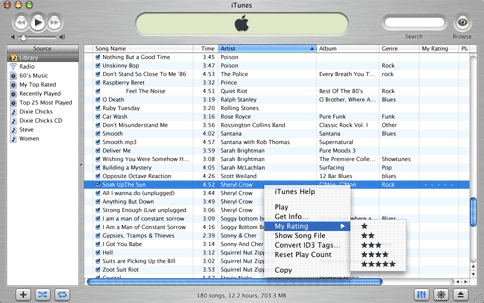
iTunes then automatically finds the type of songs you've asked
for and creates a personalized playlist - Smart Playlists can even
dynamically update as you add more music to your collection.
One of the standard Smart Playlists is Top 25 Most Played. This
is populated as soon as you have played a few songs and is
dynamically updated as you continue to use iTunes. This is an
especially handy feature.
If your significant other begins to exhibit a change of
personality and becomes docile and zombie-like, you can sneak onto
their Mac, check their iTunes top 25, and see if the problem can be
traced to an overdose of Barry Manilow or Seals and Crofts.
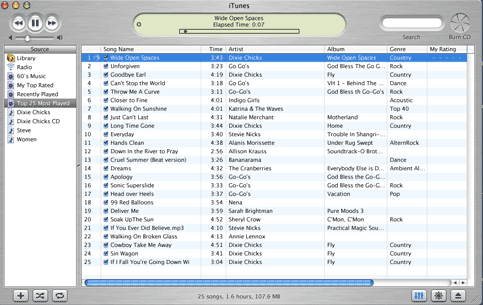
One change made to your system (with your permission, of course)
is to rearrange the way music is stored on your Mac. All music is
moved to Home>Music>iTunes>iTunes Music, with a separate
folder for each artist. In each artist's folder is a separate
subfolder for each album, with songs from the album inside this
folder. This is the logical way to store your music and a change
that is probably overdue.
It is not without its glitches, however. If you use LimeWire or
any other peer-to-peer file sharing program to share your music,
you will have to change the file location in that program's
Preferences after the music is moved. This will probably have a
limited impact, since I am certain that any music sharing our
readers do is limited to music which is in the public domain and
does not include any copyrighted pieces.
Music is organized with a strict adherence to the file names and
MP3 tags. This can cause unexpected results if you have not been
meticulous in entering this information.
For example, most of the songs from my Stevie Nicks Trouble
in Shangri La CD were entered without a hyphen in "Shangri La."
However, when I entered the hit single "Everyday," I entered the
album title as Trouble in Shangri-La, with the hyphen.
iTunes thought these were two different CDs.
This is a minor irritation, but it would be nice to see a future
release have some "smart" importing features that would minimize
this problem.
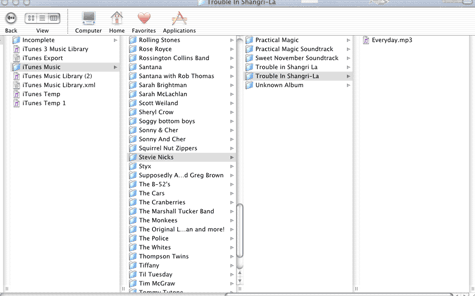
Another new feature is support for spoken word content from
audible.com in both iTunes and
iPod. Audible boasts over 18,000 audio books and audio programs
such as NPR's Fresh Air and a daily audio digest of The New York
Times. You can now listen to all 61 hours of Tolstoy's War
and Peace on your iPod!
Audible.com support requires the iPod software 1.2 update and
only works on iPods which interface with a Mac. The Apple website
does not indicate whether support for Windows iPods will be
forthcoming. Since the iPod relies on MusicMatch Jukebox Plus to
sync with Windows PCs, audible.com support would probably have to
come from MusicMatch rather than Apple.
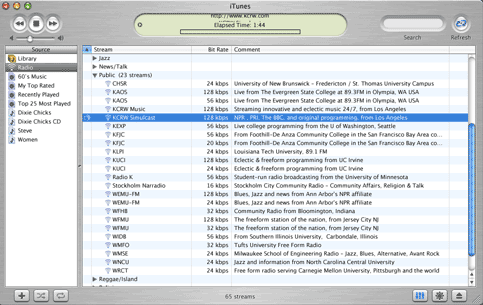
Although not new, the ability to listen to a variety of Internet
radio stations is a very cool feature of iTunes. Internet  radio truly has something for everyone. Check out
the simulcast of KCRW, and you might hear "Switcher" DJ Liza
Richardson.
radio truly has something for everyone. Check out
the simulcast of KCRW, and you might hear "Switcher" DJ Liza
Richardson.
The greatest new feature of iTunes has to be "Sound Check."
Simply by clicking in the box beside this function, iTunes will
check every single MP3 to make sure they all play at the same
volume.
This is a tremendous time saver when making CDs. I have thrown
away more than one CD because after turning up the volume to hear
the Indigo Girls' "Closer to Fine," I was nearly blown through the
roof when the Go-Go's "Unforgiven" played.
In fact, Beyond Records would be wise to use this nifty little
feature. Even on the original God Bless the Go-Go's CD,
"Unforgiven" is significantly louder than the other cuts,
especially the one immediately following, "Apology."
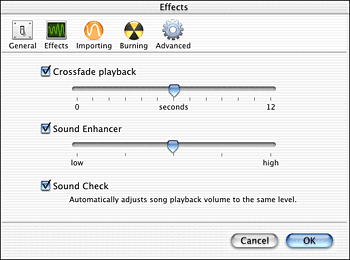
Verdict: iTunes 3 is well worth the download. It is one of the
most versatile music programs (MP3 and otherwise) available, and
best of all, it's free! 





 radio truly has something for everyone. Check out
the simulcast of KCRW, and you might hear "Switcher" DJ Liza
Richardson.
radio truly has something for everyone. Check out
the simulcast of KCRW, and you might hear "Switcher" DJ Liza
Richardson.

